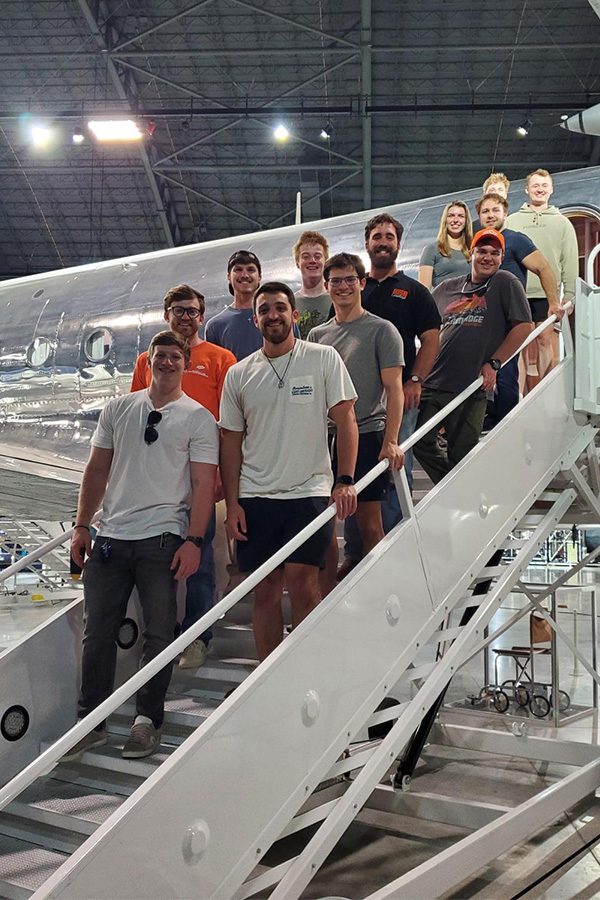
MAE students continue making strides in turbine research through Aerospace Propulsion Outreach Program
Wednesday, December 18, 2024
Media Contact: Tanner Holubar | Communications Specialist | 405-744-2065 | tanner.holubar@okstate.edu
The Aerospace Propulsion Outreach Program allows college seniors to present their design work on turbine engines during a conference at the National Museum of the United States Air Force in Dayton, Ohio.
The Air Force Research Laboratory and the Air Force Life Cycle Management Center provide mentors for students through APOP. It serves as an outreach program for engineers about to enter the workforce.
Participants are challenged to modify small gas turbine engines and make innovations on current turbine engines. College of Engineering, Architecture and Technology students participate in the spring annual event.
Dr. Kurt Rouser, associate professor in the School of Mechanical and Aerospace Engineering, said students will design and fabricate variable-area engine nozzles. These nozzles will be installed on a JetCat P100 turbojet engine and tested at Tinker Air Force Base in the spring.
Approximately 12-16 students will present their research at the APOP expo in April as they compete against students from other universities nationwide.
This fall, there have been more freshmen, sophomores and juniors involved with this project, allowing more students to gain experience earlier in their college careers than in previous semesters.
With underclass students more involved in a larger capacity, students will be more familiar with the components of turbine engines by the time they are seniors.

Rouser wanted to foster an interdisciplinary approach to this project by involving mechanical engineering technology and electrical engineering students along with MAE majors, allowing students to gain experience in other disciplines.
By having students from multiple disciplines work closer together, this can alleviate some challenges that previous teams have faced, such as manufacturing or control design issues.
“MET students can bring their manufacturing expertise and electrical engineering students bring their expertise with electrical systems, meshing well with the rest of the disciplines,” Rouser said.
With most of the basic design and analysis done for these engines, students can focus on more detailed aspects to ensure engines are ready to be tested. Tinker AFB can test these types of engines, and the testing will take place before the APOP expo.
Through APOP, Rouser and students meet regularly with members of the Air Force who serve as mentors and project managers. Among the mentors they meet with are Capt. Brian Kelsey and Dr. Fred Eisert, who are stationed at Wright-Patterson AFB. They also meet with CEAT alum Trey Van Velsor and Lance McLaughlin, who are stationed at Tinker AFB.
These mentors guide students by providing feedback, allowing them to learn first-hand from industry experts.
“I’m here to answer questions and provide a helpful industry perspective on things,” Van Velsor said. “Jet engines aren’t that difficult to understand, but the application can be tricky. I want to help bridge that knowledge gap between what you learn in the classroom and how you can apply it well to an engine.”
Rouser said the APOP partnership has expanded what is possible in the MAE department.
“This really fits all nice and neat,” Rouser said. “I’d like to say I had all these things worked out in my mind years ago. But the reality is, I think through divine providence, this has come together and worked successfully, and the APOP program is one of the things that made this possible.”
